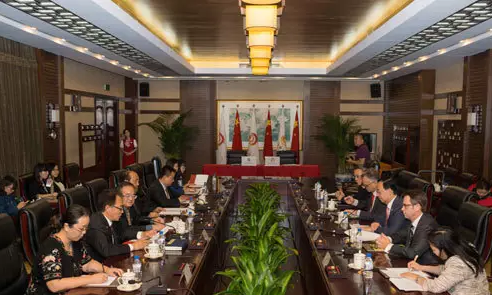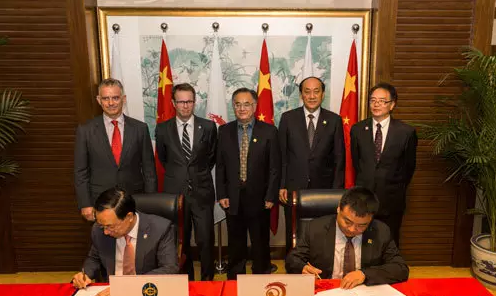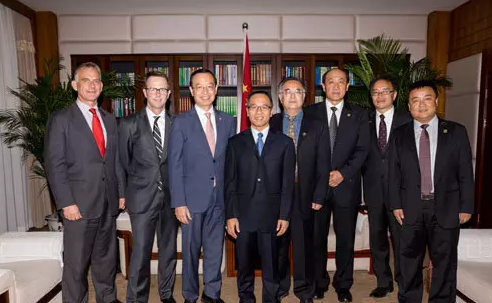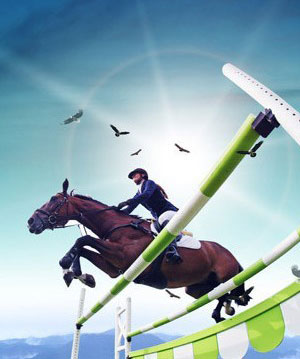The China Horse Industry Association (CHIA) and the Hong Kong Jockey Club signed a Memorandum of Understanding (MOU) in Beijing on September 22, 2015, marking a milestone in the rapid development of China’s horse industry and sparking wide press coverage around the world at the same time.

Based on the principle of equality, the strategic partnership aims at promoting the cooperation and exchange between Mainland and Hong Kong and establishing a comprehensive system for the development of the horse industry in China.
Dedicated to the revival and prosperity of China’s horse industry and culture, the CHIA has been making unfailing efforts to introduce racing events suitable to China, keep registry of the China Stud Book, establish facilities and regulations on doping test, and provide the best horse welfare. It is worth noting that since the founding of the CHIA Racing Committee, the Association has launched a dozen renowned racing events to extend the value chain of horse industry in China.

“The China Horse Industry Association sincerely thanks the Hong Kong Jockey Club for its support in developing China’s horse industry over the past years, and we cherish this strategic partnership very much,” remarked Mr. Jia Youling, chairman of the CHIA. “The modern horse industry in China started quite late with a weak infrastructure. However, there emerges an urgent need to advance the Mainland’s horse indutry towards international integration in accordance with the rapid economic and social development of China.”
“Over its 130-year history, the Hong Kong Jockey Club has showcased its every effort to ensure absolute fairness in horse racing, provide the best horse welfare, and safeguard the interests of horse owners and customers. These are exactly the experience and expertise which we should learn from the Club,” Mr. Jia added. “We look forward to a successful cooperation with the Hong Kong Jockey Club to achieve this objective.”

“The Club is honored to be trusted as a strategic partner of the CHIA and excited to play a supporting role in helping the CHIA achieve its objective of enhancing the horse industry’s infrastructure,” said the Hong Kong Jockey Club’s Chief Executive Officer, Mr. Winfried Engelbrecht-Bresges. “We were very impressed by the holistic approach taken by the new leadership of the CHIA. Racing is a selection process for breeding. A solid foundation built on a sound stud book, doping control, and horse welfare is critical for the long-term development of the industry’s value chain from breeding to racing competition.”
During the past four decades, the CHIA has been making great efforts to advance China’s horse industry towards international integration. Aiming at developing the horse industry further, the CHIA launched two Grade-1 races – the Silk Road China Cup and the CHIA Cup – in July 2015, and attracted the entry of many top racers from the United States of America, France, Ireland, New Zealand, and Australia. In order to extend the value chain of horse industry in China, the Beijing Horse Auction was staged for the first time on September 8-9, 2015.
Moreover, the premiere of the China Breeders’ Cup as the third Grade-1 race held in Ordos, Inner Mongolia on October 1, 2015 will attract great attention. Meanwhile, the CHIA will initiate a dozen Grade-2 races as routine events in Xinjiang and Inner Mongolia. In addition to the Thoroughbred races, the CHIA is also preparing to introduce racing events for such native horse breeds as the Yili horse and the Wushen walking horse. On the one hand, these racing events will greatly revitalize the local agriculture and farming; on the other, they will help bring economic prosperity and transmit the cultural values of the minority groups from generation to generation in particular.
“Horse plays an important role in the long tradition of the Chinese culture,” said President Xi. “This noble animal symbolizes not only the character of perseverance, but also the spirit of endurance.” Bearing the “One Belt One Road” blueprint in mind, the CHIA is willing to try its best to find ways to introduce racing events suitable to China in order to fulfill its dream of reviving the horse industry as a whole.












